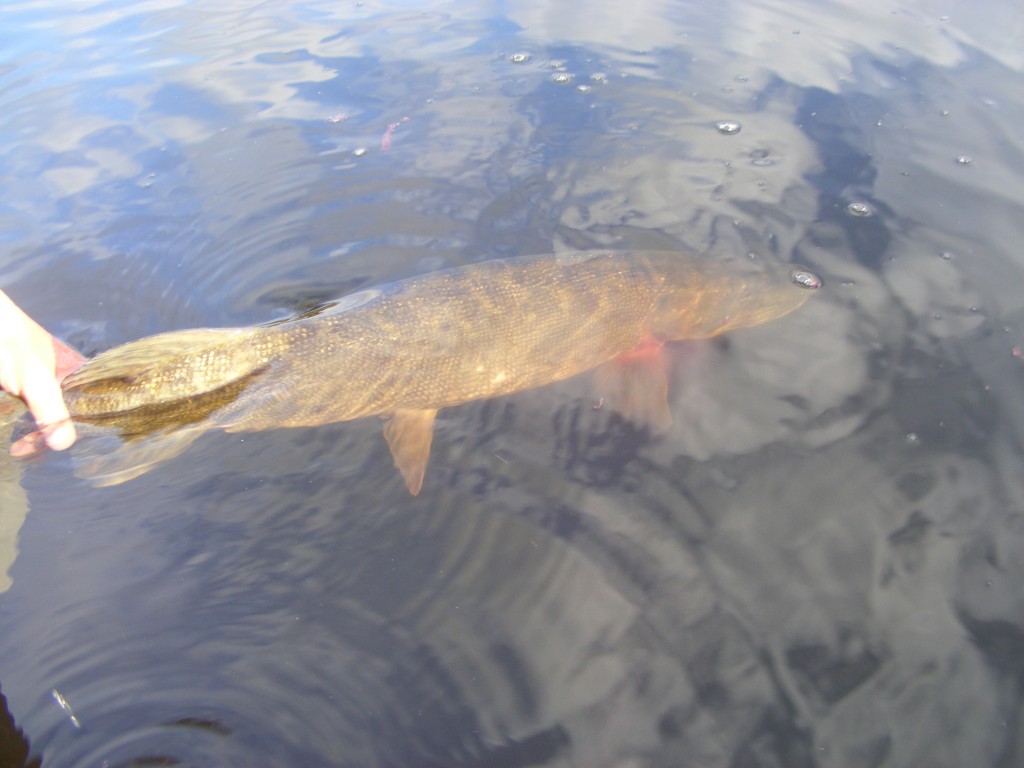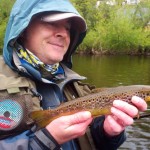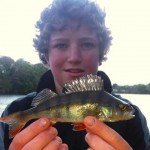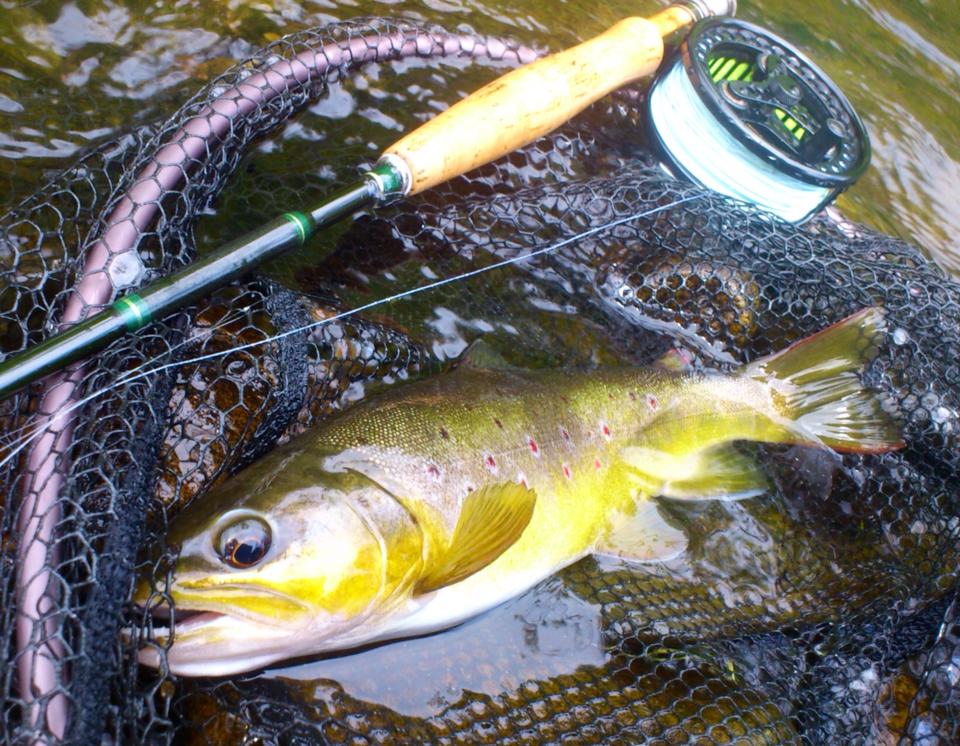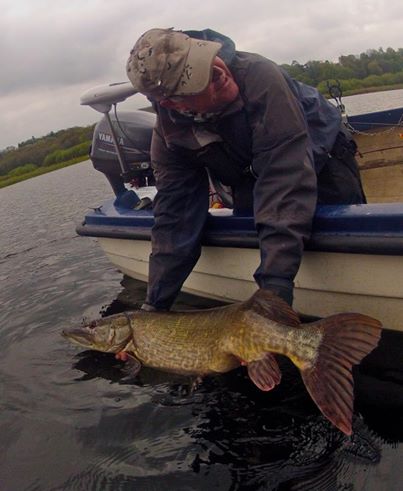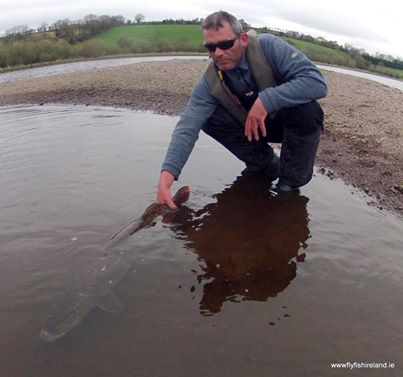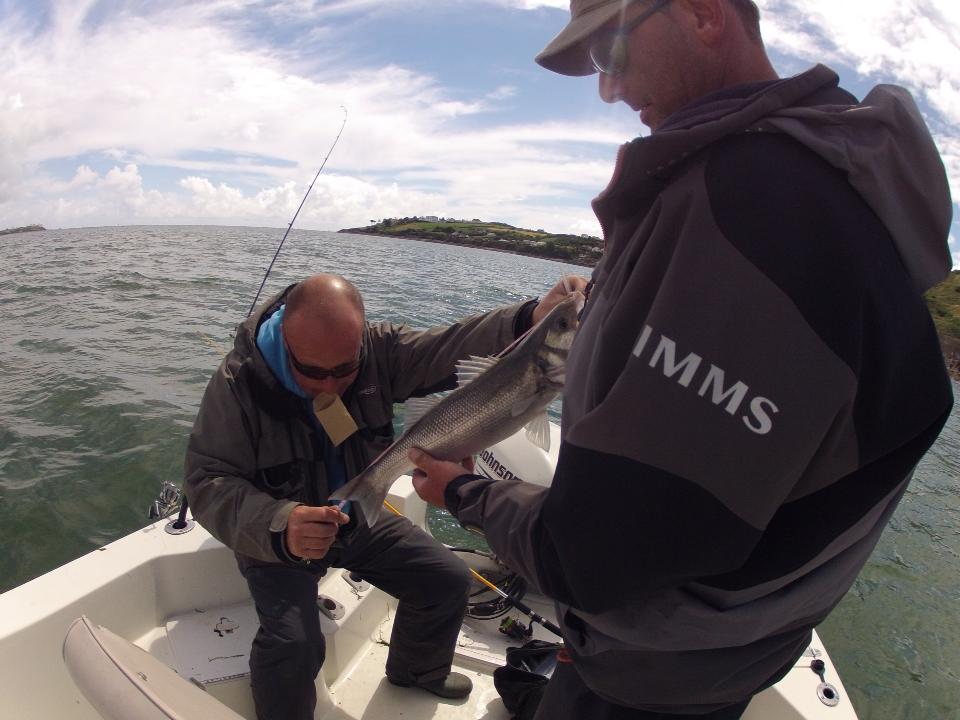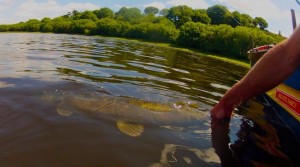Do you think much about how you handle your catch - Most do! William Kavanagh, angling all rounder, reckons that we need to be more conscious of our handling of fish in order to preserve our sport....
” fish are too valuable to be caught only once” – Lee Wulff
I suppose many anglers around Ireland have been in a winter slumber a sort of fishing hibernation if you will. Many fishermen keep going through the winter, myself included, and the season flies by very quickly and before you know it your into a new season and you haven’t had time to think or put things into perspective on the how the previous campaign turned out.
Spring is on its way and anglers everywhere have a new and heightened awareness about them. Salmon Fishing has already kicked off albeit slowly. Trout anglers are preparing for a season on the lakes or rivers, bass fishing with lures has slowed and is probably in transition although the bait-fishing beach dwellers are catching a few bass all through the winter. Other sea anglers are being battered by storm force winds and complaining of too much fresh water in the estuaries and many beaches have been weeded out since before last December. There is not an angler out there that is not hoping for better conditions in order to get the year kicked off.
Pike fishing apostles are in the thick of it in some fisheries around the country while others are in the middle of a lull on their local waters. I would think coarse and carp anglers are also itching to get cracking on their favourite swims as well , to be honest I can’t wait to get to a river for a trout fishing session. I feel like drug addict searching for my next hit and I’m going to explode if I don’t get it. That’s the way I feel each year at this preseason time and I am sure that I am not alone out there as well!
Before you all grab your gear and burst through the door like Indiana Jones maybe stop for a minute and think: How can we do better this season to improve the way we catch, handle and return the species we are hunting? It does not matter whether we fish in fresh or salt water, it matters little whether we fish with lures or bait – without our treasured fish what would drive us? What reason would we have to behave the way we do? What reason would we have to be so excited at the beginning of the angling year?
When I look around and see so many problems created in nature, mostly by people’s actions or lack of them, I wonder how we have what we have in terms of our stunning locations. Apart from natural catastrophes, the amount of man-made problems on our waters seems to grow. Just when you think we are making progress we suddenly have more problems with pollution, illegal fishing and even poor management of waters.
There is a need for us all to try to improve what we have and make all our fisheries better for everyone. We need to set an example – starting with our own approach and attitude towards our fish and fisheries. We need to pass these good habits to the people we meet along the way.
We need to start the “best practice” approach at home and in our clubs. We need to pass our love of the sport to the younger generation. Kids will emulate their parents to a large extent. We need to pass on the best information available to all anglers and especially the future anglers. Whether that information comes from Inland Fisheries Ireland, clubs and angling associations or your own experience does not matter. What matters is that the “best practice” mentality is passed on.
Catch, Handle, Release
Let’s look to those three words “Catch, Handle, Release”- we have a foundation to begin with. We need to start with the choice of the tackle we use for each and every species we fish for. Nowadays we have a lot of crossover tackle that can be used with different techniques to catch different species in both fresh and salt water. Time spent making the right choices on rods that will be suitable to handle the size, weight and power of the fish you intend to pursue during the season can only be a good investment. Good choices on those rods can make the playing and landing of fish a more enjoyable experience for and the angler can give the fish a better chance of a strong and quick return. Get the choice wrong and we stand a good chance of damaging that which we hold so dear – our target species. Reels and line must be considered carefully in order to make informed choices so we can fish with a balanced outfit that offers the best possible sport for the angler and give the fish the best chance of being subdued quickly and returned healthy. Fishing either too heavy or too light for the target species usually ends in tears! The brands of tackle that you use is a personal choice for many different reasons. In my experience quality definitely comes up trumps when you need it most. Quality is not necessarily the more expensive piece of kit but over the longer term quality kit will last so choose wisely and search out decent information.
Hook choice is so important whether they are being used on flies , bait or lures as they will play a huge part in the whole process that we are aiming to achieve – Best practice in Catch, Handle & Release. Anglers are generally driven towards the big brands in hooks as the perception that these hooks will be consistent in quality. It should be noted that many manufacturers offer similar pattern hooks but with differing material. It is an area that deserves some study. Here more so than anywhere else, price does not always guarantee quality. As far as the fish is concerned the rest of your gear is close to irrelevant so getting hooks right is important.
Catch, Handle, Release
The handling of fish can be looked at from different angles. Are we going to eat the fish or return the fish alive? The fish that we intend to eat needs to be handled properly even though the same care may not applied. We need to dispatch them quickly and to give the fish its due respect we need to prepare and store them correctly in anticipation of a fine meal later. Dispatch your fish quickly rather than leaving it foundering on the deck or in a fish box. The quality of fish will be enhanced by “bleeding”, the fillets will be in perfect condition.
The quantity of fish retained by anglers causes problems and opens up a whole can of worms. It is one of the reasons I have written this article at this time. Many times I have seen people kill way too many fish , it sometimes seems they are in a trance and just can’t stop.
Catch and kill based competitions see lot of fish being killed. It may be done for a very poor prize or for a place on an International team, either way your sport will continue to suffer and you need to express you catch and release beliefs to your organisation.
As has been said – Your limit is not a target. Keep only what you are going to consume.
So we are going to attempt to handle a fish which we intend to return safely to its natural environment. Careful planning once again will pay dividends in order to be successful, we also need some experience and watching and learning from those who know what is required is the best way in my humble opinion . You can see decent handling in action here:
http://www.youtube.com/watch?v=F9Aymo0YbqI
We will have many different situations in which fish can be handled and released , from trout anglers on rivers using a catch and release hand net or just removing the hook in the water and letting the fish swim away unharmed. In all cases it is best to hold the fish gently until it is strong enough to swim away. When we intend to photograph our prize we must have a plan in place to keep the fish in good condition, while we prepare to get cameras on the right settings. Dipping and reviving while this is done , giving it time in the water and giving it oxygen keeps it calm while you take some snaps. Often leaving the fish in the landing net until it is time to take a snap is a good idea too. When done correctly, respectful handling gives your trophy extra time for a healthy return and a chance to fight another day .
Text Book Release
http://www.youtube.com/watch?v=O333L236nmQ
Salmon anglers will do something similar, big trout will also need this type of care . Reviving small fish in a river or a lake is easy because of their size ,just hold them in a wetted hand or with a net and remove the hook and return . A large Trout or Salmon will need time to get its energy back after a hard fight these fish need support to keep them upright. Holding these fish close to the head and tail from underneath while facing its head into the current will do the job .On lakes or other still waters using a net to revive the larger fish will be perfect. Placing the fish in a landing net will help you to hold the fish while you revive it in a similar manner, getting water circulating through its gills.
Fishing from a boat in freshwater or at sea is a little different because we often have to deal with wind and maybe even tricky shorelines where the boat may be drifting onshore . This is a time when your boat partner should be close to telepathic and play his part in a successful capture and release . Big fish are best to be safely netted. The correct choice of net is essential , sometimes a net will not be big enough! At sea the successful landing of sharks and their release is a science in itself!
When it comes to handling, the Pike must always come first unless you are drowning and close to losing your life! Releasing a fly caught Pike is more straight forward than any other method of Pike fishing , this is true most of the time because we are dealing with a single hook . Pike release can be a little bit tricky when using dead baits due to the sheer number of hooks that may be used. Using dead bait will be your greatest challenge when handling these wonderful fish. A very inquisitive angler once asked me is there a case for less hooks? I think there is. A single treble hook is more of a problem as it can be swallowed easily so two semi barbless trebles are better. Either way, careful handling is a must and the welfare of the fish must be placed ahead of your tackle. Releasing pike when they are caught on lures is usually fairly straight forward as well . Most pike lures will have a treble somewhere on the rig and this is where you must be careful especially if the fish is fresh and feisty.
Handling and returning carp and other coarse fish require similar equipment as pike equipment such as mats.
http://www.youtube.com/watch?v=65iC_aw9FA4 .
Lip Grips
When recently browsing Facebook I came across a campaign to ban the use of Boga grips when pike angling . When I took a little time to think about it I can fully understand why the campaign has a strong following. I think there is a place for them and I know many anglers who use them for other species e.g. bass and perch . Once again correct handling by giving good support along the length of the fish is required . Pictures of fish dangling by its jaw from a gripper do nothing for the sport nor anything for the fish. Using grippers when dealing with slimy fish is a good idea and it also gives a precise weight to the fish where the gripper has an inbuilt scale. It really is a case of a gripper being a good tool in the right hands and a liability in the hands of an amateur. Holding a large fish in vertical position for long periods with the grip does the fish no good at all . A hook release tool might be a better option, grabbing the hook and not the fish.
My message is simple. Our sport is under more pressure than ever before. Illegal activity, pollution, weather and natural phenomena all conspire to make our sport more difficult. As anglers, let us not contribute to the problem. Simply put , best practice in terms of fish handling is important. If we do not lead by example then our sport will suffer.

